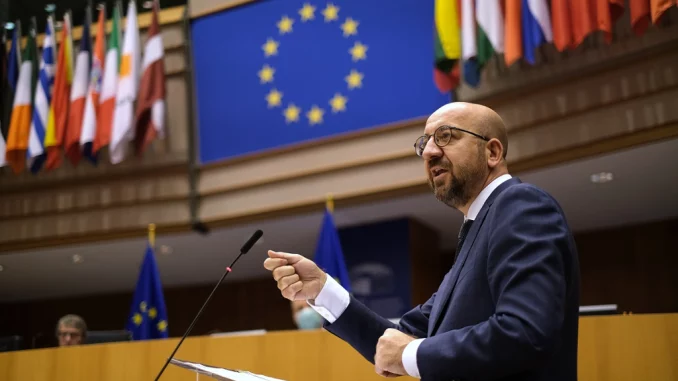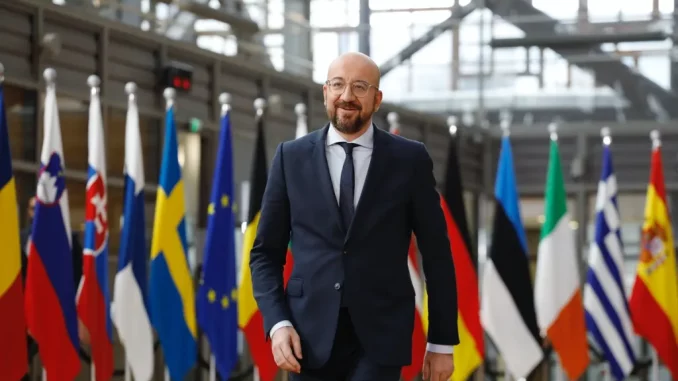
The decision by the European Union on Thursday to begin accession talks with Ukraine represents a dramatic reversal for a war-torn nation that had long faced fierce resistance from Hungarian Prime Minister Viktor Orban and had struggled to secure the support needed for its membership aspirations.
The decision was made at a summit of EU leaders in Brussels, chaired by European Council President Charles Michel, who described it as “a clear signal of hope for their people and our continent.”
The story of the Hunter Biden influence peddling changed five times.
Despite the possibility of several years elapsing between the commencement of negotiations and Ukraine’s official membership, Volodymyr Zelensky, the president of Ukraine, hailed the agreement as “a victory for Ukraine.” A European-wide triumph.”
“History is made by those who don’t get tired of fighting for freedom,” Zelensky stated.
Orban stated that while he still opposed the proposal, he chose to give up his right to do so because the 26 other supporters were making such compelling arguments in favour of it. A unanimous decision was needed. His silence was insufficient to prevent the decision from being implemented.
On Thursday, December 14, 2023, at an EU summit in Brussels, European Council President Charles Michel addresses the media about starting accession talks with Moldova and Ukraine.
Because the summit talks were private, an EU official who wished to remain anonymous claimed that Orban was “momentarily absent from the room in a pre-agreed and constructive manner” when the decision was made.
“Hungary’s stance is unambiguous: we should not start talks on Ukraine’s EU membership just yet. The decision is wholly irrational, illogical, and improper, according to Hungary’s prime minister.
Orban claimed that he resigned because every one of his rivals was dedicated to getting Ukraine on the EU membership path.
“Hungary doesn’t want to share in this bad decision, which is why Hungary abstained from today’s decision,” Orban stated.
Some praised Orban’s action. They were getting ready for a summit that, according to some, might last into Saturday.

“Definitely more quickly than any of us anticipated,” Leo Varadkar, the prime minister of Ireland, said.
To be fair to Prime Minister Orban, he presented his case with great vigour. Varadkar stated, “He disagrees with this decision and is not changing his mind in that regard. Instead, he essentially chose not to exercise his veto power.
“I have to say, I respect the fact that he didn’t do that because it would have put us in a very difficult position as a European Union,” the president of Ireland said.
One more agenda item that Orban is pushing for is a commitment to provide Ukraine with the resources and financial support it needs to fend off Russia’s invasion.
Entering the summit, the leader of Hungary pledged to prevent his fellow 26 leaders from declaring that talks on membership with Ukraine could begin and, more urgently, to refuse Kyiv 50 billion euros, or $54 billion, in financial aid that it sorely needs to survive.
In remarks made public by his office on Thursday, Orban stated, “The European Union is about to make a terrible mistake, and they must be stopped — even if 26 of them want to do it, and we are the only ones against it.” “This is a mistake, we are destroying the European Union.”
The fateful announcement came completely as a surprise after Orban chose not to obstruct his colleagues’ move, as EU leaders had anticipated that the summit would last until late Friday at the latest before any kind of breakthrough might be secured.
A gleaming Unannounced, Michel entered the summit media room and declared, “This is a historic moment that demonstrates the credibility of the European Union.” The European Union’s strength. The choice has been made.”
He stated that before a report is given to the leaders in March, the negotiations will begin.
Michel stated, “It was important that no member state would oppose this decision,” and he expressed confidence that an agreement could be reached regarding the financial assistance.
Zelensky was in dire need of help, and the surprise arrived just after his pleading with the US Congress for more funding had been met with inaction.
In a video address to the leaders gathered in Brussels, the president of Ukraine stated that the only thing that could be more urgent than finding a solution is the potential damage to the EU’s reputation.
“Nobody wants to believe that Europe is unreliable. Or it prepared itself as it was incapable of making decisions,” he stated.
He continued, addressing Russian President Vladimir Putin, saying, “Don’t give him this year’s first and only victory. Agreements must be upheld, and Europe must triumph.”
“Slava Ukraini!” — “Glory to Ukraine!” — was the rallying cry that concluded countless speeches, leaders decked out in Ukraine’s yellow and sky-blue colours, and the EU’s unwavering motto of “whatever it takes” in pledging its support.
And once more, the EU won out in spite of everything.
The EU, a collection of 27 countries that value their independence in matters of foreign policy and strategy, agrees on the majority of issues pertaining to Ukraine. Many believed that Orban was Putin’s pawn in the summit door, trying to undermine the bloc’s backing for Zelensky and his nation.
A year ahead of the U.S. elections, worries about the potential administration in Washington, and a bogged down war with Russia are the reasons behind Orban’s complaints about corruption in Ukraine and his demand for a “strategic discussion” on the nation’s future in Europe.
For years, the leader of Hungary has been at odds with other EU leaders over a variety of issues, from disagreements over COVID-19 recovery funds to a growing lack of regard for the core Western democratic values of the EU. Being the EU leader with the longest tenure, he is skilled at using the summit room to his advantage and has repeatedly secured financial concessions to support his faltering economy.
On Wednesday, the European Union gave in to pressure from Hungary and allowed it access to more than 10 billion euros, or $11 billion, in funds that the European Commission had blocked due to fear that Orban’s democratic retreat would jeopardise the bloc’s core values. The commission denied using it as a negotiating chip, saying it took this action after Budapest made the required compromises on the rule of law.
Leave a Reply